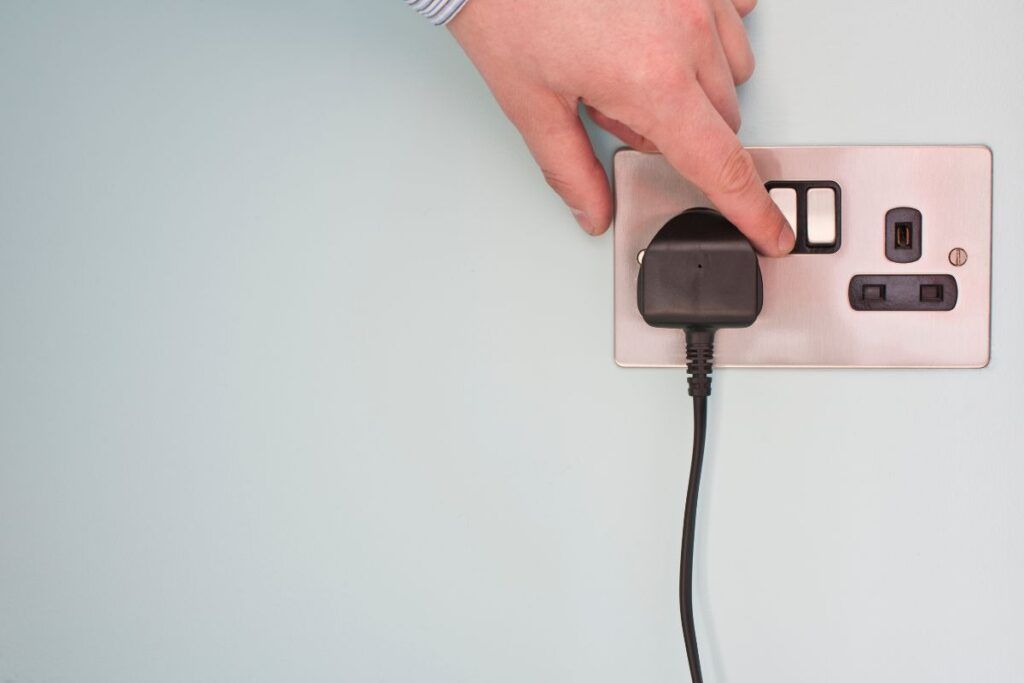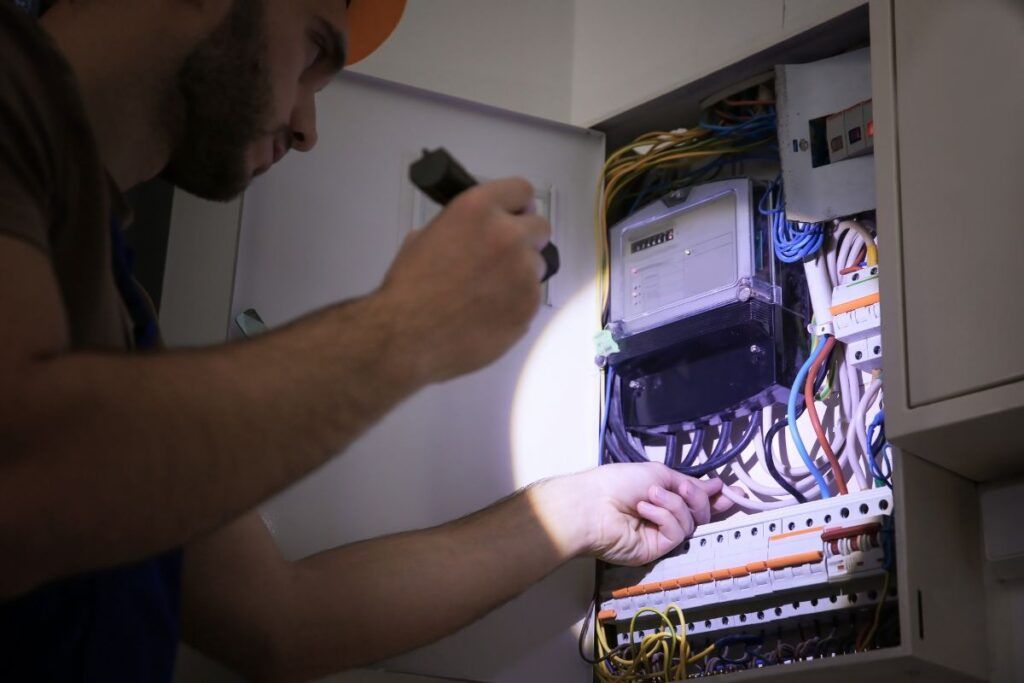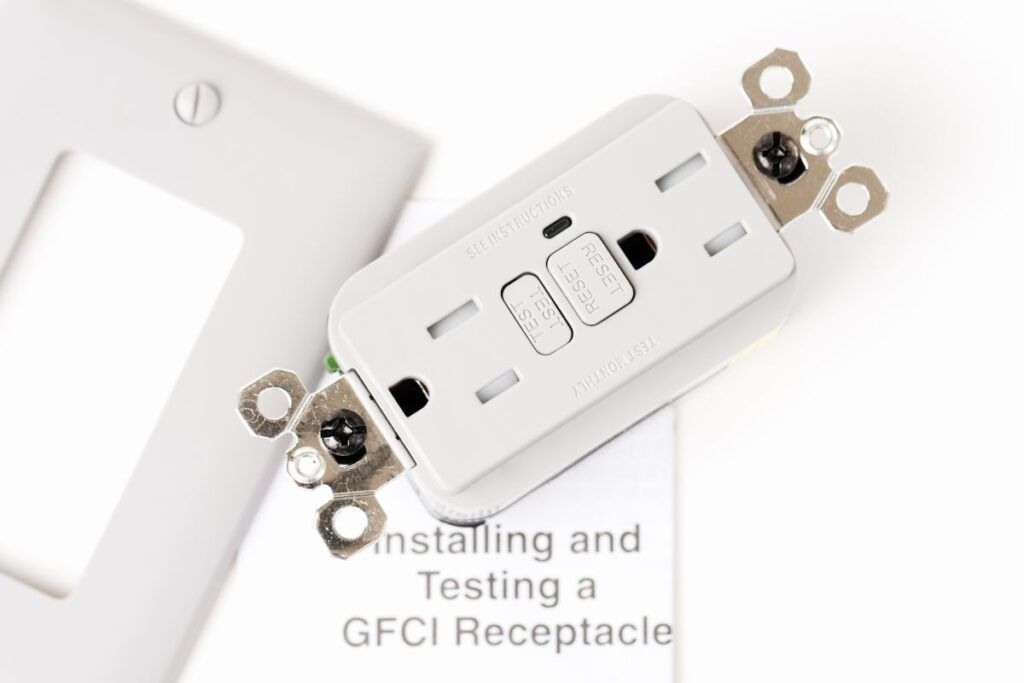Electric shock is the worst mishap that no one wants to experience. Working with electric wires and devices is tricky, and you must be careful. If you want to know how to ground yourself from electric shock, this is the right place to learn all the safety precautions.
You can prevent yourself from the electric shock by shutting off the electric supply before you start working on any electric device or wiring. For the safe use of electric devices in the bathroom, install the GFCI protection. Also, avoid using higher voltage equipment on small outlets.
Let’s discuss different ways to ground yourself from the electric shock while working with electric devices. You will also learn how to prevent lightning strikes when stuck in a heavy storm.

Check out our list of top-handpicked products for all your electrical, appliance, and HVAC system needs to keep your home running smoothly.
This post includes some affiliate links.How to protect yourself from electric shock at home?
Electrical devices and equipment are an unavoidable part of life.
The use of electricity and electronic items is increasing day by day.
An average person cannot imagine spending a day without electrical devices in the modern world.
Electrical devices like refrigerators, washers, dryers, and microwave ovens make life easy.
And we cannot survive this modern era without electricity.
That being said, electrical equipment also comes with a potential danger of passing electric shock to us.
It is important to be equipped with the knowledge to protect yourself from electric shocks.
Let’s discuss how you can ground yourself from electric shock while at home.
Here are some practices you can bring to your home to avoid electric shock:
1. Replace any damaged extension cord
Extension cords are used with devices whose power cords can’t reach the electric outlet.
This extension cord supplies electricity to the device in your desired location.
They make it possible to use multiple devices at a time.
But it would be best to use an extension cord correctly to avoid electric shock.
If the extension cord is damaged, you must not risk using it with heavy-duty appliances like refrigerators and washers.
You must not even use a damaged extension cord with any electrical devices.
Avoid overloading the extension cord to prevent electrical hazards.
Consider choosing the right extension cord depending on the voltage and current supply of electrical equipment.
Use a 10 -12 gauge extension cord for heavy-duty appliances like refrigerators.
Ensure not to hide the electric cord under the carpet.
And keep the extension cord out of the reach of children.

2. Replace all the defective electrical devices
Electrical devices won’t last long; they become defective over time.
When one of the electric devices is faulty or completely damaged, you must replace the device as soon as possible.
Don’t risk using it, as it will cause potential harm to you or your family.
If you have decided to repair the device, unplug it from the electric outlet before starting the repair process.
By replacing the defective electrical device, you can prevent electric shock.
3. Safety measures in the bathroom
It is common to use electrical devices in the bathroom.
So, it is important to insulate the bathroom with a protection system.
A study reveals that an average of 400 hundred people are getting an electric shock at home, resulting in 200 deaths in the USA yearly.
Isn’t that scary to know?
You can prevent yourself from electric shock by installing ground fault circuit interrupter (GFCI) protection in the bathroom because it is the spot where electrical devices come in contact with water.
This GFCI protection system automatically disconnects the electric supply from the device when it comes in contact with water.
4. Use a three-prong power cord

When plugging the electrical device into the electric outlet, ensure it has a three-prong electric cord.
The third prong is the ground plug.
It will divide the excess electricity to the ground whenever over-voltage and power fluctuation occur.
If no ground plug is attached to the electric cord, the excess electric supply will damage the device or pass it to you when you come in contact with it.
So, don’t remove the third prong from the electric cord.
Even when you use an extension cord, make sure you use a three-prong cord and connect it properly to the extension outlet.
How to protect yourself while lightning?
As per the survey by Statista, in 2021, 69 injuries and 11 deaths were recorded due to lightning.
Here are some instructions to avoid such mishaps during lightning.
Safety measures while indoors during lightning

It’s great if you are indoors, but you should still keep these in mind.
1. Avoid running water
Light strikes will travel through the pipes or the plumbing system during storms and heavy rain.
If you have used mental pipes throughout the plumbing system, you must be extra careful to avoid running water during lightning.
Consider not taking a bath or washing dishes during thunderstorms and lightning.
2. Avoid using electrical devices
During thunderstorms, avoid using electronic devices like laptops, computers, ratios, dryers, and stoves when plugged in.
Because during storms, lightning strikes travel through electronic devices.
There is a potential danger of getting an electric shock while using the devices during lightning and thunderstorms.
It is also advised to let the devices unplugged during lightning to prevent them from damage.
Consider protecting your home with the whole-house surge protection mechanism to eliminate potential lightning-related harm.
3. Close the windows and stay away from the wall
When there is heavy storm and lightning, it is not a good time to enjoy the rain by keeping the windows open.
Consider keeping the windows closed and staying away from the door.
Check if bars and metal wires are attached to your home’s walls.
Avoid staying close to the walls as the electricity will travel through the metal bars and wires.
Safety measures while being outdoors during lightning

Here are some important things you should remember if you are outside during a storm.
1. Head indoors
It is not safe to stay outdoors during storms and lightning.
When you hear heavy thunders and lightning, immediately find ways to stay indoors.
See if you get inside shopping malls or office areas or get inside the car if you are far away from home.
While getting inside a car, make sure to keep the windows shut.
2. Prevent yourself from danger
If you are stuck in an open area, you must seek shelter to prevent yourself from lightning strikes.
Instead of standing straight, crouch yourself on the ground with your head lowered and keep your hands over the ears.
Make sure to have less contact with the ground.
Don’t find shelter under a tree as they may pass the lightning strikes to you when you lean against it during lightning.
If you are stuck in forest areas, avoid standing near tall trees; instead, stand near the shorter ones.
While finding shelter during lightning, check if the place you stand has electricity-conducting materials like power lines.
Also, ensure you are away from the water bodies like lakes and ponds, as they easily conduct electricity.
3. Never stay in groups
If you are stuck in a storm as a group, you must first separate yourself from others and advise the same for everyone.
When you stay in a group, everyone has the potential of getting injured from lightning if even one person gets a lightning strike.
4. Stay away from the open spaces
Lightning can easily strike you if you stand in an open space like a playground, park, or beach.
Check if you can seek shelter in a closed space nearby parks and playgrounds.
5. Stay away from the tall buildings
Check if tall buildings and apartments are around you when you are stuck in a storm and lightning.
If you find any, immediately get yourself out of place, as tall buildings are prone to lightning strikes.
Get yourself to a safe indoor place to prevent any mishap.
How to prevent yourself from electric shock while working with electrical equipment?
If you often work with electrical units and devices, here are some points you must consider next time you work.
1. Shut off the electricity

If you start to work with the electric device, disconnect it from the electric outlet to avoid any mishap.
You must unplug the device from the electric outlet and secure it to prevent it from getting damaged.
In case of hard wiring, turn off the circuit breaker connected to the device you are working with.
2. Check with the non-contact voltage tester
Even after turning off the circuit breaker, you must not touch the wiring or the electric equipment directly.
It is because some heavy-duty appliances like refrigerators and washers carry electricity inside them significantly after being shut off from the electricity.
It is safe to test it with the voltage tester to ensure that the device is shut off completely.
Let’s say you are fixing the wiring issue in your home, shut off the electric supply and test the wires with a voltage tester probe.
After ensuring there is no voltage supply to the wires and the device, you can safely proceed with your work.
3. Switch to insulated tools
You might be wondering why one should use an insulated tool even after shutting off the electricity and rechecking with the voltage tester.
But it is good to have a safe backup as there are more chances of getting caught with an electric shock due to accidental electrical connections.
Use an insulated screwdriver, wrench, and even an insulated tester.
Getting the insulated tool kit is advisable to ensure all the tools you use are well insulated.
4. Install GFCI protection

While working with the electric devices, especially when plugged in, connect those devices to the GFCI protection system.
GFCI expands as a ground fault circuit interrupter that automatically detects the electrical issues in the device to turn it off to prevent potential damage.
Also, use GFCI protected extension cord to prevent the device from getting damaged.
5. Switch off before you unplug
While the device is plugged in with the electric outlet, only plug it in directly by switching it off.
You can directly unplug small appliances; consider not doing the same with heavy-duty appliances, which will cause an electrical hazard.
6. Handle the capacitors with safety
A significant amount of electricity is stored in the capacitors to help the motors run with the high voltage.
So, don’t forget to check if the electricity is completely shut off from the capacitors before you come in contact with the device.
How to prevent electric shock during Halloween?
Halloween is the best time we celebrate with family and friends with beautiful decorations.
To make the celebration end joyfully, you must make sure you take enough safety measures during decorating lights.
Follow some tips mentioned below:
- Avoid using damaged wires and the electric cord.
- If you use any electric device, ensure it is meant to be used outdoors.
- Don’t connect the electric cord in an area where children play or in a high-traffic place, as it may accidentally get tripped.
- Connect indoor and outdoor decorations to the GFCI circuit to prevent potential harm.
- Kids are excited during the Halloween celebration as they get dressed up and enjoy the beautiful light decor, so it is important to make sure candles, and electrical decorations do not come in contact as they may cause potential harm to the children. Choose decorations that are flame resistant.
Final thoughts
If you are a DIY person constantly working with an electrical device, it is important to know the precautions you must take to prevent yourself from electrical hazards.
Before starting to work with any electric device, unplug it from the electric outlet. Choose the right electrical cord extension, and replace them immediately if they are damaged to eliminate the electric shock.
While buying electrical appliances, confirm if they come with a three-prong electric cord. Don’t use an extension cord that comes with two-prong plugs. Don’t use already damaged or defective; replace those devices with new ones for your safety.
If you are stuck in a storm, follow the safety measures mentioned in the article to ground yourself from the electricity.
Reference: Electrical Grounding, Electrical wiring Wikipedia.
